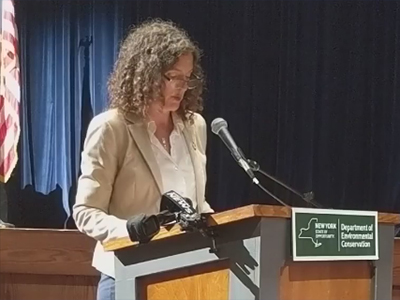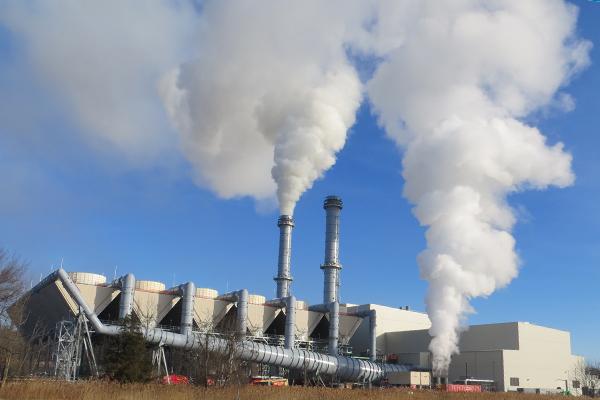MIDDLETOWN – Area residents and elected officials overwhelmingly encouraged the DEC not to approve the CPV power plant’s application for renewal of their Title IV Acid Rain permit and Air Title V permits, arguing they do not align with the state’s current legislation regarding climate protection.
At DEC hearings in Middletown, speakers said in addition to claimed negative health symptoms, CPV is not in line with the recent Climate Leadership and Community Protection Act.
Senator Jennifer Metzger (D, Rosendale) said not only has a local health impact survey had 80 residents, within a 20-day period, provide a troubling trend of physical symptoms believed to be caused by proximity to the plant; but, if New York is to have a carbon free energy system by 2040, as established by the legislation, CPV’s intended longevity outlives that deadline substantially.

“If you think about it, we have 21 years until we’re supposed to reach our new goal of a carbon free electricity system, by the new goal of 2040 and this project has a lifespan, a useful lifespan, of more than double that. It just doesn’t make sense,” said Metzger.
Keith Chue, a local electrical engineer opposed to the permit renewal, agreed with Metzger that power plants like CPV shouldn’t even be considered if the state is serious about that legislation.
“The legislation calls for a dramatic reduction in greenhouse gas emissions, and it calls for a transition to carbon-free electricity,” said Chue.
According to Pramilla Malick of Protect Orange County, Dr. David Brown of the Environmental Health Project, a researcher working on behalf of their organization, indicated that the current permit regulations will allow for approximately 120 different chemical emissions.
Malick said the current regulations make it just as likely for CPV to meet compliance for approval, or to be denied and the decision will come down to purely political motivations.
“If the state wants to permit the project, there are enough provisions in the regulations to allow it to permit it. If the state wants to shut down this project, there are enough provisions within the regulatory system to deny it,” said Malick. “Ultimately, it is a political decision. Our governor has to decide, is he going to be a climate leader, or is he going to be a climate deceiver? Is he going to be an environmental leader, or is he going to be an utter and absolute hypocrite.”
Michael Edelstein, president of Orange Environment, said the plant should never have been built. He cited environmental issues and cited the Joseph Percoco scandal that “further taints the decision making process.”
“The public meetings are important because they’re an opportunity for interested parties to discuss the facts around our facility,” said Tom Rumsey, CPV’s senior vice president of external affairs, said in a statement. “When the discussion is focused on data, it’s clear CPV is good for the environment and the regional economy.”
The state DEC will be accepting written submissions on the issue until 5 p.m., July 29. Comments can be submitted by mail to the Department of Environmental Conservation, Christopher Hogan, 625 Broadway, 4th Floor Albany, NY 12233. Emailed comments will be accepted via depprmt@gw.dec.state.ny.us.








